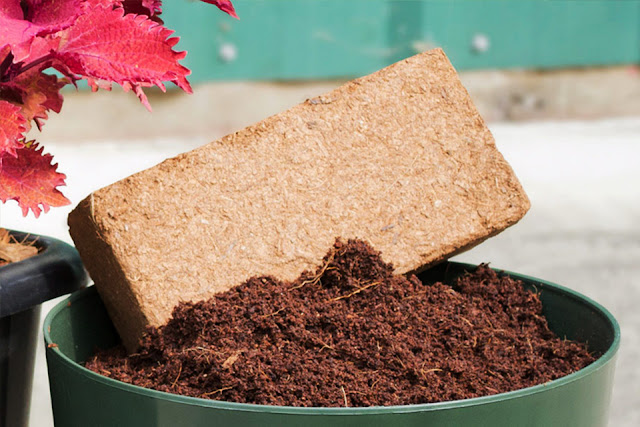Coco Fiber
Coir Pith
Coir Pith A spongy material that binds the coconut fibre in the husk, coir pith is finding new applications. It is an excellent soil conditioner and is being extensively used as a soil-less medium for agri-horticultural purposes. Coir Pith is an organic tiny particle which is obtained from coconut husk while separating fibre from husk.

Coco-coir pots are made up of the coconut hull that is derived from the fibrous body between the husk and the coconut. These biodegradable pots are an excellent growing medium because plants can be transplanted into the pot itself. Coco-coir pots have an exceptionally high permeability to water, air and roots.
The
coir pots break down naturally in the soil, which minimises root
disturbance at the time of planting. Gardeners looking for faster
cultivation, an excellent root system and re-establishment without any
shock from transplanting use Coco Coir Pots.
Coir Pith A spongy material that binds the coconut fibre in the husk, coir pith is finding new applications. It is an excellent soil conditioner and is being extensively used as a soil-less medium for agri-horticultural purposes. Coir Pith is an organic tiny particle which is obtained from coconut husk while separating fibre from husk.
Coir,
(pronounced COY-er) comes from coconuts. It's what makes up the fibrous
husks of the inner shell of the coconut and is used for all sorts of
products, including rugs, ropes, brushes, and even upholstery stuffing.
We're probably most familiar with it as those stiff, scratchy doormats
and the fibrous liners used in hanging baskets. Coir is very rot
resistant, making it perfect for outdoor products. It is also becoming
increasingly popular as a potting mix and organic soil amendment.Coir
pith is also known as coco peat or coir dust.
Coir goes by many names. You may find it labeled as coir-peat, coco-peat, coir fiber pith, coir dust,
and other similar sounding brand names.Coir is commonly sold in
compressed blocks. These are easy to transport and bulk up quickly and
easily, for use.
Coir Pith Blocks

Coir pith is used as combustible fuel in boilers in some countries as the colorific of coir pith is high.
Also it is used as an organic fertilizer in horticulture and floriculture as a soil container and substitute
for soil. Its water retaining capacity and compressibility besides light weight are the main
characteristics which make it widely applicable.
Coir
pith not only revitalizes your plants, it induces uniformity in growth
by enhancing water retention and microbial activity. Coir pith contains
high quality of nutrients that keep the soil healthy in a natural way.
It acts as a top dressing that helps maintain moisture and reconditions
the soil.
Uses of Coir Pith Blocks
• As a potting mix
• For mushroom growers
• As a soil supplement & Prevents regular watering
• For generating seeds
• For tissue cultured plan
• Friendly to the Environment
• Reusability
Coir pith block can be used as potting medium. It can be mixed with required fertilizers and
nutrients according to the type of plant to be grown.
Coir Pith Shaped Pots
Coco-coir pots are made up of the coconut hull that is derived from the fibrous body between the husk and the coconut. These biodegradable pots are an excellent growing medium because plants can be transplanted into the pot itself. Coco-coir pots have an exceptionally high permeability to water, air and roots.
Benefits of using Coir Pots
1. Water Holding Ability of Coco Coir
2. Coco coir pots allow the roots to grow freely
3. Repotting or transplanting is very easy
4. Beneficial pH Value
5. Coco Coir is Packed with Nutrients
6. Use Coco Coir as a Potting Medium
7. Using Coco Coir for Hydroponics Systems
8. Coco Coir can be recycled



Comments
Post a Comment